![[RSS]](/static/img/feed-icon-14x14.2168a573d0d4.png) Conservancy Blog
Conservancy Blog
Displaying posts
tagged conferences
![]()
Join me at Free Society Conference and Nordic Summit!
by on November 2, 2017
I'm delighted to be en route to Oslo, Norway as I write this post. I'll be speaking this weekend at FSCONS, the Free Society Conference and Nordic Summit. FSCONS is admittedly a small event, but has a theme that is absolutely intriguing and incredibly important to the future of software freedom. As can be read on the FSCONS website, the conference looks at the intersection of society, culture and technology. They invite speakers from throughout the Open Source and Free Software world as well as Free Culture and privacy and other technology activists.
I'll be giving a talk entitled The Crumbling Intellectual Infrastructure of Free Software & Free Culture Licensing. My talk will explore the history of Free Software and Free Culture licensing, how it relates to rise of for-profit popularity of Open Source, and the larger political and societal implications of where we are now. Admittedly the title sounds bleak, and I'm certainly known for my pessimistic talks about the future of software freedom, but I'll also include suggestions and ideas for activists to work to solve the problems our community now faces.
I want to thank in advance the great work of the organizers of FSCONS. Not only are they funding travel for speakers, but they've sent numerous clear and understandable emails about the weekend's events. It's made my planning smooth and easy.
I really encourage you to join us in Oslo this weekend; tickets are still available, and I did a quick check and round-trip flights from major cities in Europe this weekend to Oslo are around €200. I think it's well worth the trip! See you there!
Late Summer Conference Report
by on September 29, 2017
I’ve been traveling quite a lot recently and have had the good fortune of participating in some dynamite conferences. Often we’re so busy with our work and travel that we aren’t able to make the time to report on it properly, which results in a lot of our acomplishments and activities happening silently1. August’s travel was intense, and while my inbox backlog continues to be a bit unnerving, I’ve got to tell you about where I’ve been before September is completely over too!
GUADEC: GNOME’s 20th Birthday!
As many readers probably know, I’m an enthusiastic user and fan of GNOME. And, as the former Executive Director of the GNOME Foundation, I was so thrilled when I was invited to give a keynote speech at the annual main GNOME conference, GUADEC. Given that this year is GNOME’s 20th birthday, it was a special year to be able to participate in the conference.
GUADEC was invigorating. With Ubuntu returning to GNOME and the success of Endless and other commercial initiatives around GNOME, the GNOME community is optimistic and focused on the future. There were many new contributors but also a great showing amongst folks who have been around the community for a long time.
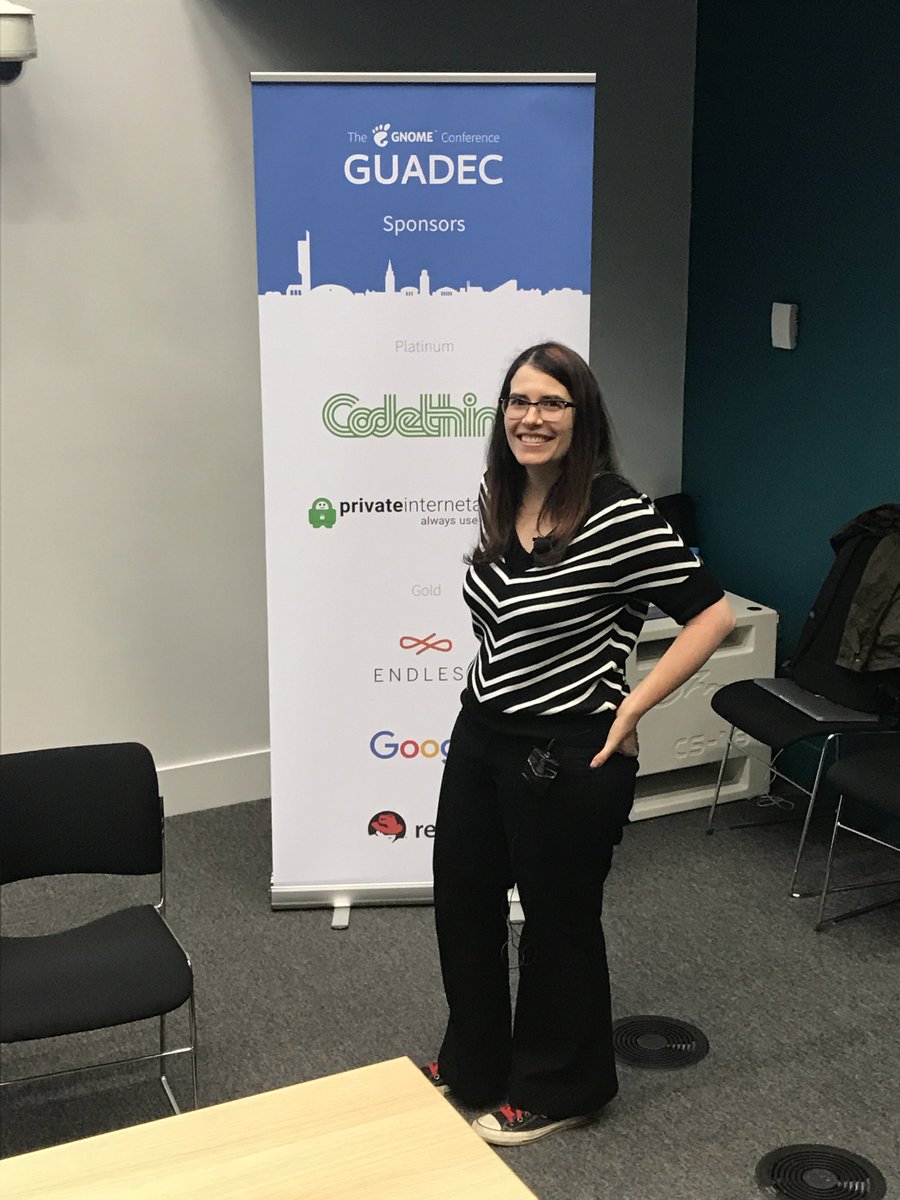
My talk focused on the personal ethical responsibilities of free software contributors and how GNOME contributors can engage in the process of steering our technology in the direction of transparency and security. While I wasn’t intending to talk about medical devices very much in my talk, for a majority of the audience this was their first GUADEC or free software conference and the topic came up to illustrate some of my main points. As a society we’re building our critical infrastructure on proprietary software, entrusting single companies with some of our most important information and interactions. I strongly believe that we need technologists to stand up for ethical technology now, especially within the companies that are producing it. I recommended that contributors engage with management to discuss the long term business advantages of doing the right thing. As it turned out, there were also several young attendees in the audience who have implanted medical devices so it was a great opportunity to connect. Over time, these issues will impact more and more people.
I was excited to see Neil McGovern, the GNOME Foundation’s new Executive Director, in action. After I moved to Conservancy, I served on a Hiring Committee to help the Foundation find the right person for this role. There were many very impressive candidates, but Neil was the stand out. Neil gave an inspiring freedom-focused talk, revealing the great job he’s already doing.
There was also a big party for GNOME’s 20th birthday which was a lot of fun. I moderated a panel on the history of GNOME, and learned a lot of fun tidbits about GNOME’s past! I was also excited to see the “Pants Award” go to Bastian Ilso, who puts together awesome videos for GNOME releases (and ropes me into doing the voiceovers too).
DebConf
Soon after I got back from GUADEC it was time to head to DebConf. I could only make it for part of DebConf, which definitely left me wishing I could have been there for the whole time.
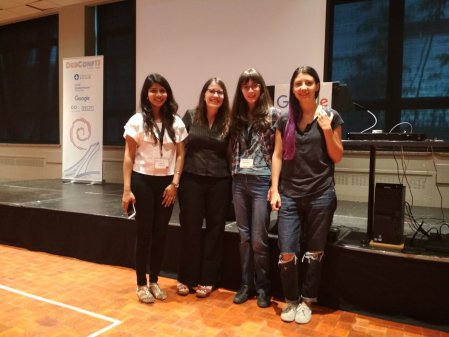
This time the conference was in Montreal, and I had the privilege of giving a presentation about Outreachy. The talk was very well attended and I left plenty of time for questions. The best part was getting to meet a number of Outreachy alums, mentors and coordinators.
I also had the opportunity to talk to Debian folks about the copyright aggregation project and to participate as a Debian Developer. This was my first Debian event since I became an official non-uploading Debian Developer. While I felt more of a responsibility to work proactively on things that Debian needed to have done, I also felt a strong sense of belonging in the community. When DebConf was held in New York seven years ago, I went briefly for a screening of Patent Absurdity, which I was interviewed in, but was so intimidated by the conference that I basically ran away immediately after! (Somewhat relatedly, I recently recorded a brief video about Imposter Syndrome.) Being recognized as an official contributor to the project helps not only to feel like your contributions are appreciated (even if they aren’t code) but also that you are more than welcome in a community - that you are a part of it.
FrOSCon
The last conference I got to this summer was FrOSCon. I hadn’t heard of this conference until recently and was surprised to learn how big it is. Primarily a local German conference, FrOSCon attracts almost 2000 people. Like FOSDEM, the event runs only over the weekend. Also like FOSDEM, the conference organization is extremely impressive. When I arrived the night before the conference, I went over to see if I could help get things set up but there were so many people there to help they actually had nothing for another person to do!
I was asked to do my standard medical devices talk as the first keynote of the conference, and I was glad I gave that particular talk - the room was full of people who hadn’t heard it. The questions I got were insightful and the enthusiasm in the discussions after I spoke was exciting. I also did a couple of interviews with local tech press reporters and met some fabulous people which led to great discussions. A few of us spontaneously gathered a working group on ethics for IoT and informed consent. Since then Emma Lilliestam, who also spoke at FrOSCon about issues related to software and cyborgs, has been writing up these issues and further developing thought on the topic.
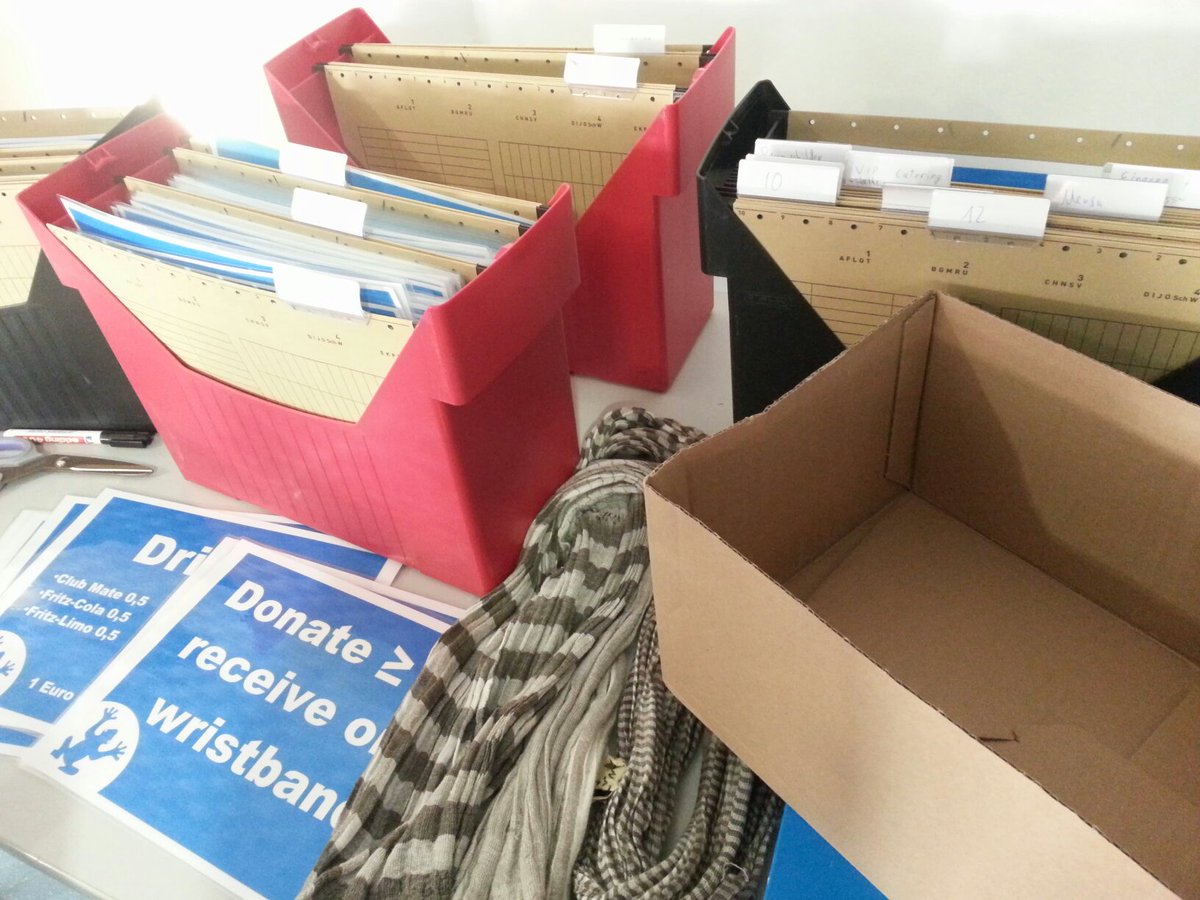
I fully appreciated the organization of the event when I stuck around to help with takedown.
It was amazing to see everything get taken down, cataloged and organized for next year. FrOSCon is definitely a conference I would recommend to others in the future.
While the summer is over, it seems like it’s always conference season. This evening I’m delivering a keynote presentation at Ohio Linux Fest, a conference I’ve always wanted to attend. While it’s a lot of travel, I’m grateful to get the opportunity to meet with so many people interested in free an open source software and to have the chance to encourage folks to think about the important issues of our day. If you attend any conference that I’m at, please be sure to say hello!
1 Conservancy has a staff of four full time people, which includes no marketers, campaigns people or anyone focused on PR.
Git Merge and FOSDEM 2017!
by on February 17, 2017
For me, FOSDEM this year started two days early with Git Merge, the annual Git conference. Git Merge is organized by GitHub, and so far in all three years of its organization the conference has donated the proceeds from ticket sales to Conservancy! I’d been hoping to get to Git Merge one of these years, so I was very excited with the organizing team asked me to do an talk introducing Conservancy.
I got to kick off the conference, and introduced myself by explaining how investigating my heart condition and defibrillator caused me to become passionate about software freedom. I then delved into what Conservancy does and in particular talked about some of the work we’ve done with Git. The talk had a good impact, and all day long I was able to speak with people who were excited about Conservancy and thinking about the ethics of all of our software. It’s always especially thrilling to speak at our member projects’ conferences. I love meeting up with leadership committee members and also putting faces to the names that we see go by while monitoring the activities of our projects.
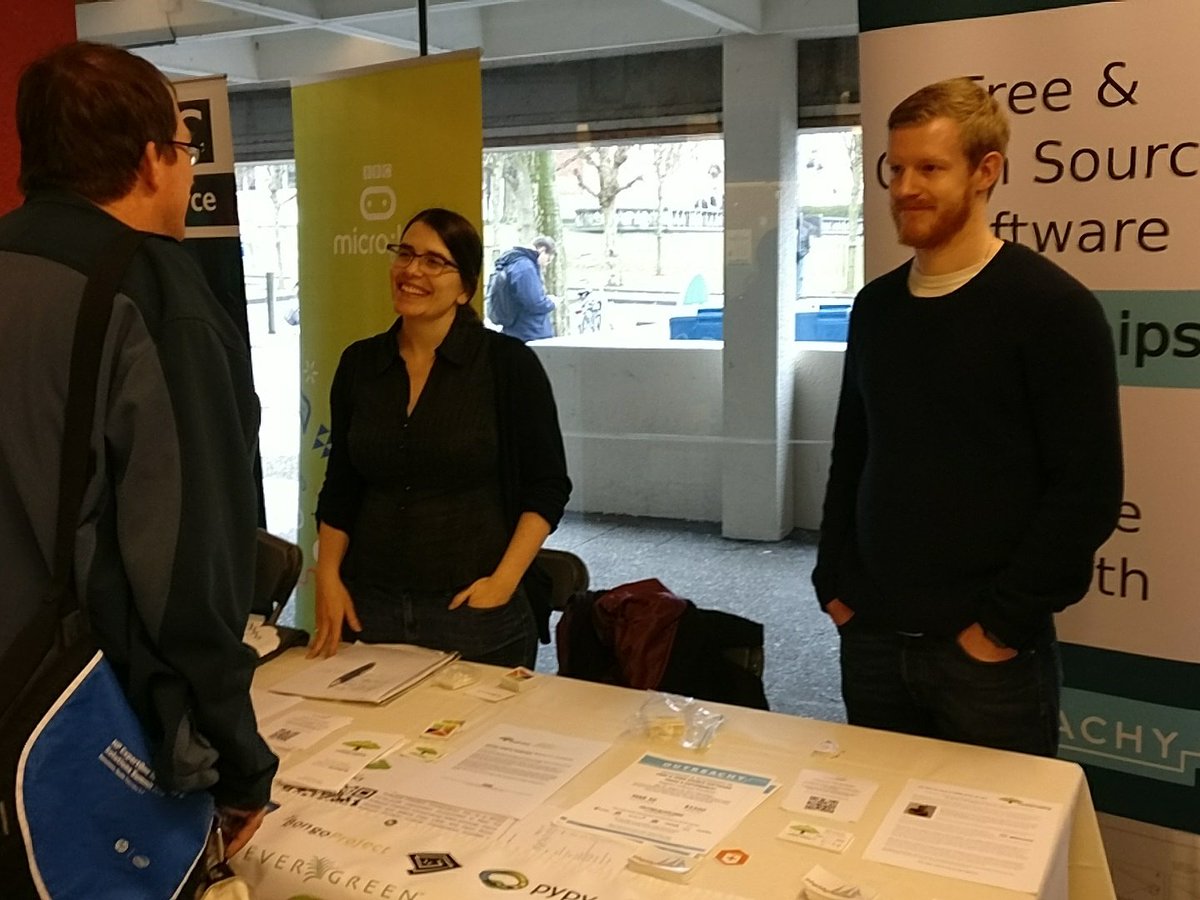
Photo by Neil McGovern
FOSDEM is an extraordinary conference. A two-day whirlwind of activity, there are many more worthwhile things there than any one person can get to. The whole conference is completely community run and organized. Companies can buy neither stands nor talks in any of the devrooms, which keeps the quality really high. Thousands of people attend FOSDEM and there are great conversations happing everywhere. I find it incredibly difficult to balance seeing people, attending talks (even in my own devroom) and keeping the Conservancy stand running.
Fortunately for us, the FOSDEM organizers were very thoughtful and placed the Conservancy stand just across the hallway from the Legal & Policy devroom, which Bradley and I help organize. I spent most of the time running between the short distance between the two.
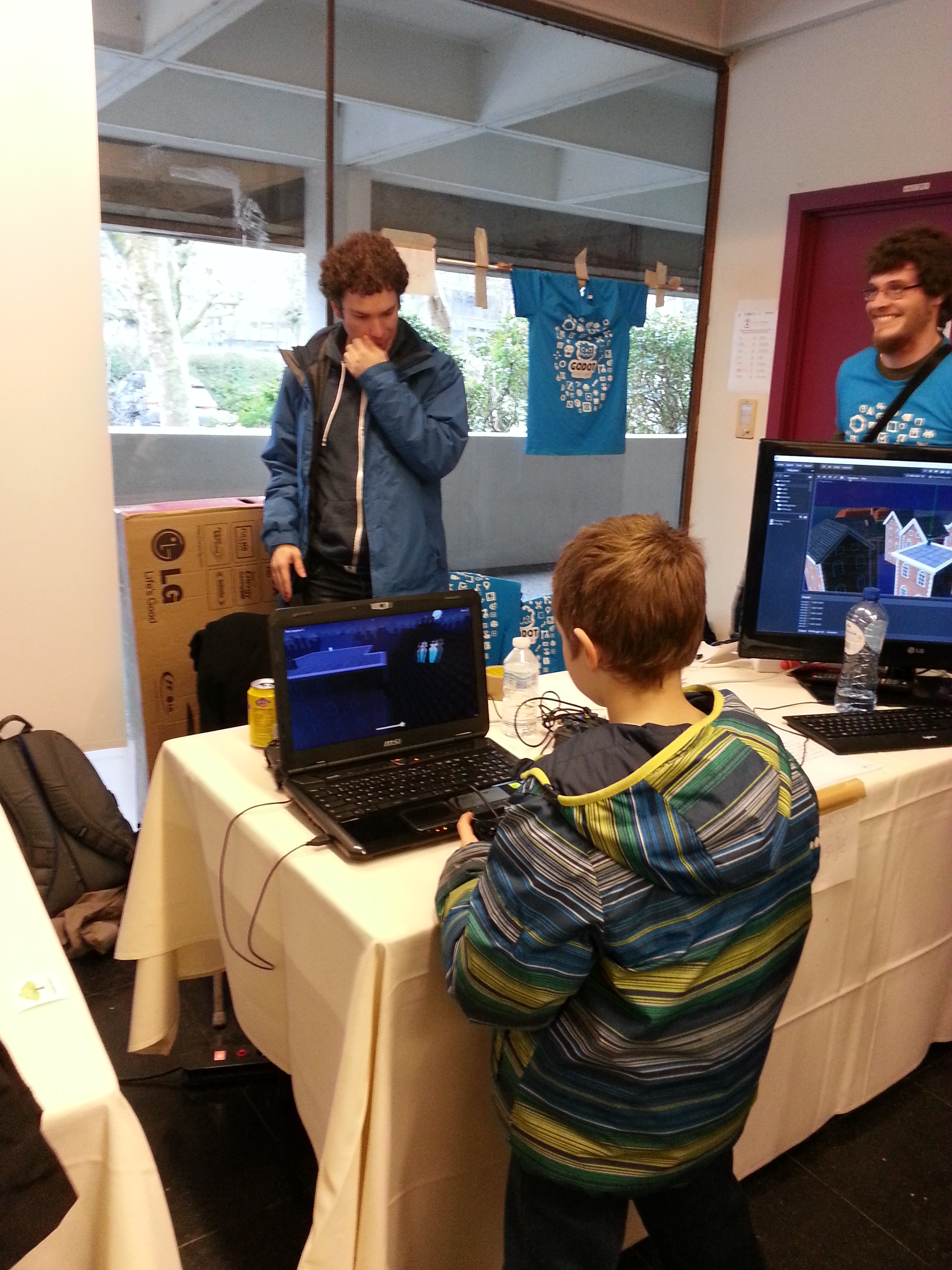
One of the major highlights for me was being at the stand with volunteers. Mike McQuaid (of Homebrew, another member project) and Spencer Krum both spent significant time at the booth loudly heckling people into becoming Conservancy Supporters. Stefan Hajnoczi (of QEMU, also a member project) took a quieter but no less dedicated approach. Michal Čihař spent a huge portion of his conference in our booth helping to promote phpMyAdmin and Conservancy. Having people who are giving of their time already so eloquently advocating for our organization was powerful, and helped me feel so energized about Conservancy. We’d launched our match donation that day, and I think it generated a lot of excitement at the booth. We also were lucky to be right next to the stand for one of Conservancy’s newer projects, the Godot Game Engine, which was very fun and convenient.
The Legal & Policy devroom is always fantastic, and while I wound up at the stand and in meetings for much of my time at FOSDEM, I still participated enough to really get a lot out of it. I spoke on a panel about permissive/dismissive licenses and another about fiscal sponsorship entities in Europe. FOSDEM video volunteers have been great, and video is already up for most of the sessions. A huge shout out to Tom Marble who does most of the heavy lifting in organizing the room. There are a lot of great places to discuss imporant legal issues but the FOSDEM devroom is one of my favorites. The talks this year were particularly interesting. I’m looking forward to catching up on the videos of the ones I missed.
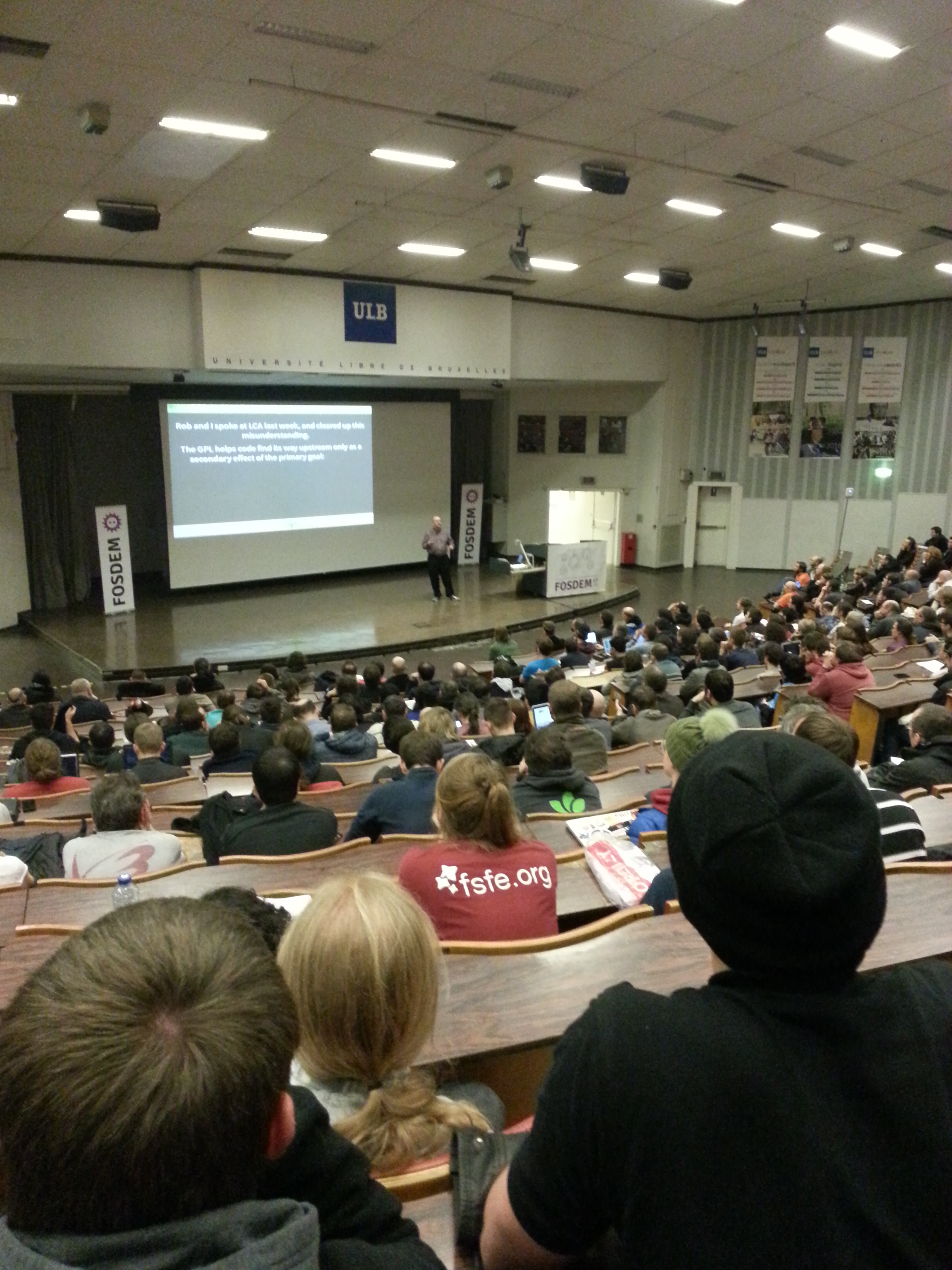
I also really enjoyed Bradley’s keynote (we closed the stand down a little early so that we could all attend). Bradley is such an inspiring speaker, and I think he distilled a lot of the major issues facing copyleft and copyleft compliance.
I think part of the magic of FOSDEM is that it’s contained in a single weekend. While it’s inevitable to feel like you wished there were more time to catch up with all of the exceptional people who attend, and it’s exhausting to have no downtime over two days (I even missed the GNOME beers!) it’s just the right amount of time to fully immerse yourself in all things free software.
linux.conf.au is Like a Dream
by on January 31, 2017
I’m writing this on my way to Campus Party Brasil, and I’m finally able to report about and reflect on linux.conf.au. I’m still buoyed by the enthusiasm and passion exhibited by the Linux Australia community.
I hit the ground running in Hobart. The organizers invited me to give a presentation in the opening plenary to introduce Outreachy. I explained why we need the program, how it works on a basic level and shared the metrics that show that the program is succeeding in its goals. Chris Neugebauer, lead organizer and emcee for the week, then surprised the crowd by announcing that Outreachy would be the designated charity for the conference. Every year, LCA picks a charity and sells raffle tickets to raise money for the selected charity. Usually this is a local charity, so this year LCA focused on raising money to support interns in Australia and New Zealand.
The first two days of the conference were mini-conference days, each organized by a volunteer to have a day-long track on a particular topic. I proposed a GPL enforcement feedback session for the Linux kernel miniconf—the third in our series. So far each session has been on a different continent to make sure that people have a chance to weigh in all over the world. The session wasn’t recorded, as we wanted to make sure that attendees felt comfortable speaking candidly. James Scheibner of the University of Tasmania volunteered to take notes to make sure we kept track of what was said. The session was well attended. I didn’t count how many people were there, but others told me that it was somewhere between 80 and 100 people. I expected the session to be like the one at Linux Plumbers, with an immediate flood of thoughts about enforcement and Conservancy’s activities in particular, but instead this session started out as a Q&A. About half way into the designated time, I stopped the Q&A and specifically asked for feedback. When no one volunteered to speak, I goaded the audience a bit, eventually saying that if no one had any feedback I was going to take it that they were happy with Conservancy’s work. The audience burst into applause, and there were shouts of “thank you!” The positive response was just fantastic. We continued with Q&A and also brainstorming about things that can be done in the future. I also facilitated a discussion in the Legal & Policy miniconf on Tuesday, which included a lot of interesting discussion too.
The keynotes were all really good, and I would be remiss if I didn’t point to r0ml’s talk “Keeping Linux Great”. There’s a full write-up of it on Rodger Donaldson’s blog. As always, r0ml’s talk was a roller coaster ride, densely packed with thoughts and observations. I was especially surprised to see he included a slide with Conservancy’s logo between pictures of me and Bradley! He said (thanks to Rodger for transcribing this):
If you think I’m a bozo, you need to join Software Freedom Conservancy, because they’re the vanguard of trying to push free and open software into the future and preventing people like me from ruining it. And if you think that I have an excellent point and that this might be the future, we still need free software to build it. We still need somebody to be the rearguard to prevent the barbarians from overrunning us while we build this future. So if you agree with me you should join Software Freedom Conservancy.
The pictures of us were huge on the giant screen in Plenary Hall—Bradley turned bright red, much to my amusement!
I also gave a talk in the same room, called “Surviving the Next 30 Years of Free Software”. I plan to write a separate post about it, but the video is already up. This deals with a lot of issues I’ve been wrestling with about how our community transitions when more of us become incapacitated and pass away. It’s heavy stuff, and a hard topic to talk and think about, but it’s important. I appreciate the fact that this topic was chosen by the conference and that many in the Linux Australia community are receptive to the ideas I proposed.
There were so many great talks and an engaging hallway track. I recommend reading Kathy Reid’s write-up of her highlights. (Also at the conference Kathy was elected to the post of president for Linux Australia.)
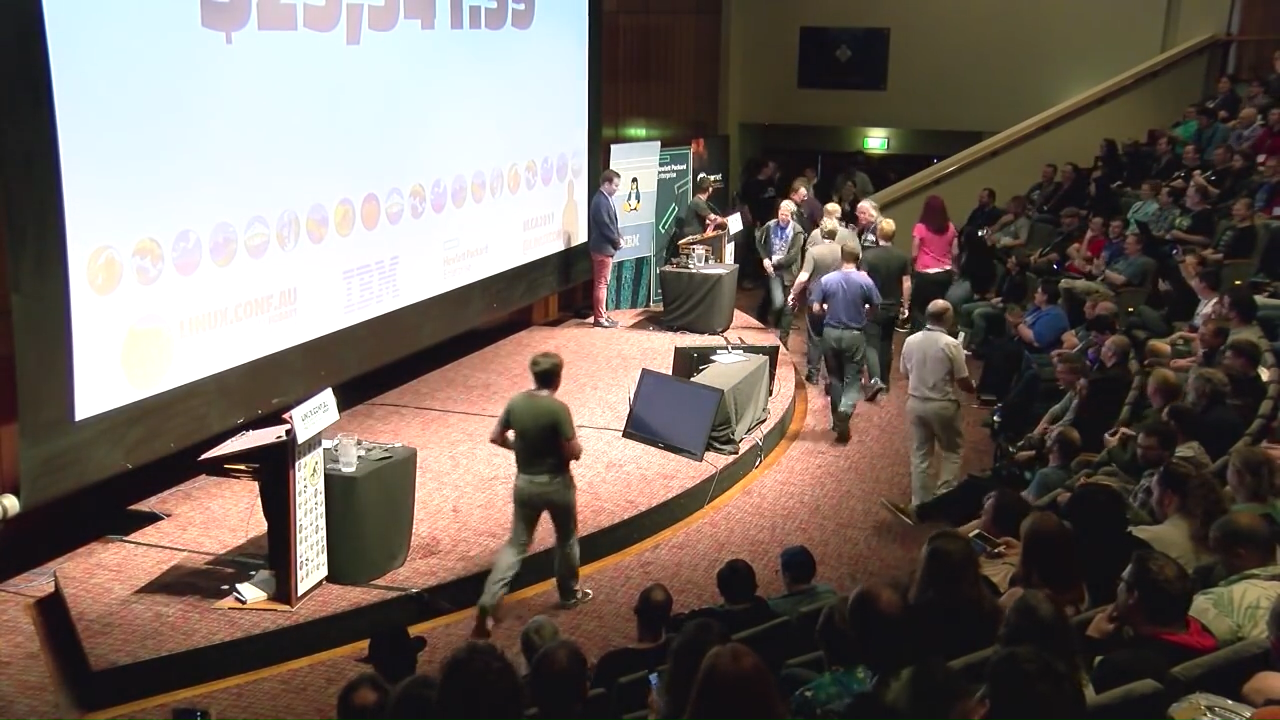
People run down to make last-minute cash donations to fund a third Outreachy intern. Picture from linux.conf.au 2017 video.
The conference wound down with fantastic lightning talks (check out Rusty Russell’s) and then I was surprised to be called to the stage by Chris. Chris, ever the showman, walked us through an ever-increasing amount of money raised for Outreachy. First, he told us that they sold many more raffle tickets than they had anticipated such that they had to get three batches of tickets and differentiate them. Then, Chris announced that two anonymous donors matched amounts and that they raised enough to fund two interns, and Kathy announced that Linux Australia was donating AU$7000! With three interns within reach, Martin Krafft ran down to the stage and called for people to donate the last amount on the spot. And then a lot of people ran down with their cash! In the end, the conference raised enough money for three interns, and the 2018 team announced that they’ll sponsor tickets for all three interns and their mentors to attend LCA 2018 (plus I got to pick the raffle winners). It was an amazing way to end an amazing conference!
Many thanks to the LCA organizing team and the Linux Australia community for keeping such a magical community alive.
